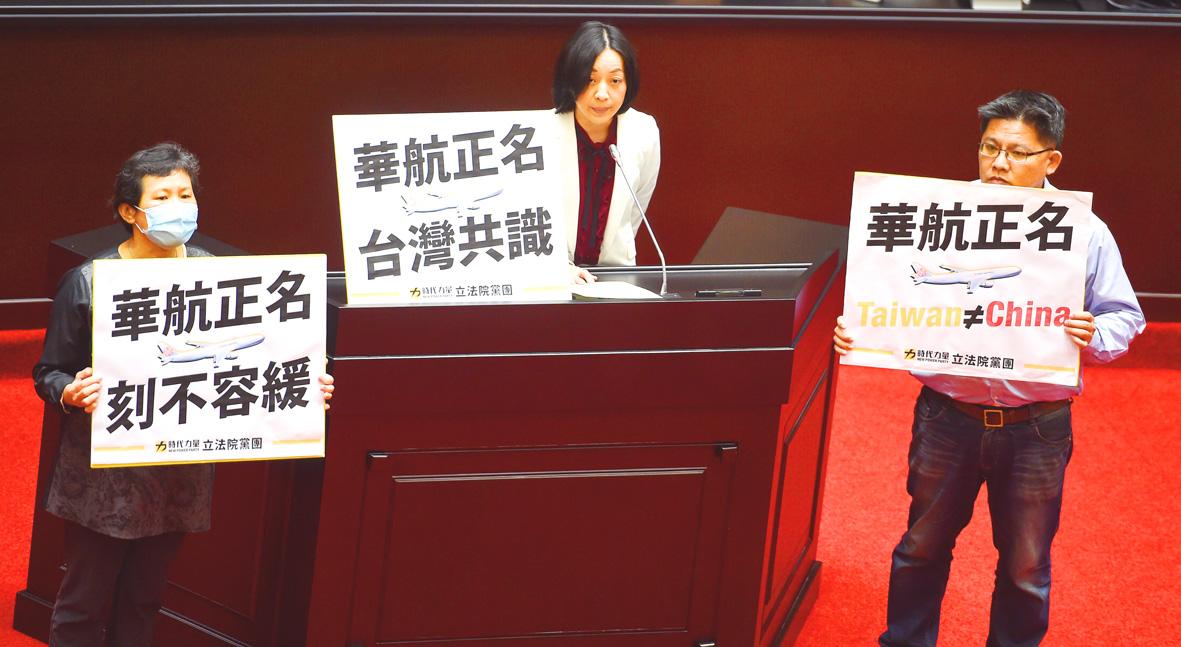Proposals to redesign the cover of the nation’s passport and rename state-run China Airlines (CAL) yesterday advanced to second readings, pending cross-caucus talks to be convened by the Democratic Progressive Party (DPP).
The DPP caucus tendered a motion to send to a second reading its proposal and one by Taiwan Statebuilding Party Legislator Chen Po-wei (陳柏惟) on redesigning the passport cover to highlight the marking or symbol of “Taiwan,” which was passed without objection.
The DPP’s proposal advocates any method that would emphasize the English and Chinese-language use of “Taiwan” on the cover, while Chen’s proposal seeks to replace the words on the cover with just “Taiwan (臺灣).”

Photo: Liu Hsin-de, Taipei Times
Chen cited the government as saying that as it strives to share with the world the nation’s achievements in containing the spread of COVID-19, the current passport design — whose cover bears the words “Republic of China” and “Taiwan” — could cause Taiwanese to be misidentified as Chinese and fall prey to discrimination.
The COVID-19 pandemic has caused some major nations to change their stance toward China, which could be followed by adjustments to their China policies, he said, adding that in this context, Taiwan should set itself apart from China, especially as Chinese state propaganda claims that Taiwan is part of its territory.
Chen said that his proposal, which was cosponsored by DPP legislators Wang Ting-yu (王定宇), Lin Chun-hsien (林俊憲) and Lin I-chin (林宜瑾), as well as 11 other lawmakers, would allow people to choose between a redesigned passport and the current version.
As nations have imposed entry restrictions amid the pandemic, Taiwanese are often flagged at immigration and resigned to explaining that they are from Taiwan, not China, Wang said, adding that the confusion could negatively affect Taiwan’s trade.
The proposal would not involve a constitutional amendment, as it only deals with the markings on passports, so relevant agencies should be able to promptly address the matter flexibly, he said.
Wang said that he supports retaining the Chinese-language title “Republic of China,” while using “Taiwan” to signal the nation’s English-language title to “minimize disagreement domestically and maximize the distinction abroad.”
Meanwhile, the DPP and the New Power Party (NPP) caucuses each tendered a proposal to rename China Airlines.
The DPP’s proposal says that the Ministry of Transportation and Communications should meet with relevant agencies to devise plans to repaint its aircraft in ways that would highlight Taiwan or its symbols, on the condition that such actions would not affect the nation’s air rights.
The NPP’s motion calls for the “China Airlines” logo to be minimized and the word “Taiwan” or its outline to be added to aircraft fuselages, following reports of European nations confusing shipments of medical supplies donated by the government with those from China.
Both proposals say that any forthcoming design must make a distinction between China Airlines and Chinese state-run Air China.
The DPP caucus is responsible for scheduling cross-caucus negotiations on the proposals to redesign the passport, while the NPP and the DPP would jointly be responsible for scheduling talks on renaming China Airlines, Deputy Legislative Speaker Tsai Chi-chang (蔡其昌) said.

POSITIVE DEVELOPMENT: Japan and the US are expected to hold in-depth discussions on Taiwan-related issues during the meeting next month, Japanese sources said The holding of a Japan-US leaders’ meeting ahead of US President Donald Trump’s visit to China is positive news for Taiwan, former Japan-Taiwan Exchange Association representative Hiroyasu Izumi said yesterday. After the Liberal Democratic Party’s landslide victory in Japan’s House of Representatives election, Japanese Prime Minister Sanae Takaichi is scheduled to visit the US next month, where she is to meet with Trump ahead of the US president’s planned visit to China from March 31 to April 2 for a meeting with Chinese President Xi Jinping (習近平). Japan and the US are expected to hold in-depth discussions on Taiwan-related issues during the

‘LIKE-MINDED PARTNER’: Tako van Popta said it would be inappropriate to delay signing the deal with Taiwan because of China, adding he would promote the issue Canadian senators have stressed Taiwan’s importance for international trade and expressed enthusiasm for ensuring the Taiwan-Canada trade cooperation framework agreement is implemented this year. Representative to Canada Harry Tseng (曾厚仁) in an interview with the Central News Agency (CNA) said he was increasingly uneasy about Ottawa’s delays in signing the agreement, especially as Ottawa has warmed toward Beijing. There are “no negotiations left. Not only [is it] initialed, we have three versions of the text ready: English, French and Mandarin,” Tseng said. “That tells you how close we are to the final signature.” Tseng said that he hoped Canadian Prime Minister Mark Carney

Taiwan has received more than US$70 million in royalties as of the end of last year from developing the F-16V jet as countries worldwide purchase or upgrade to this popular model, government and military officials said on Saturday. Taiwan funded the development of the F-16V jet and ended up the sole investor as other countries withdrew from the program. Now the F-16V is increasingly popular and countries must pay Taiwan a percentage in royalties when they purchase new F-16V aircraft or upgrade older F-16 models. The next five years are expected to be the peak for these royalties, with Taiwan potentially earning

President William Lai (賴清德) yesterday bestowed one of Taiwan’s highest honors on Saint Vincent and the Grenadines (SVG) Ambassador Andrea Clare Bowman in recognition of her contributions to bilateral ties. “By conferring the Order of Brilliant Star with Grand Cordon on Ambassador Bowman today, I want to sincerely thank her, on behalf of the Taiwanese people, for her outstanding contribution to deepening diplomatic ties between Taiwan and SVG,” Lai said at a ceremony held at the Presidential Office in Taipei. He noted that Bowman became SVG’s first ambassador to Taiwan in 2019 and